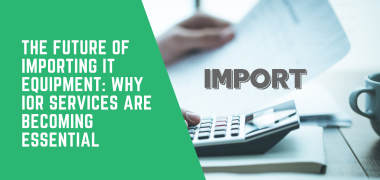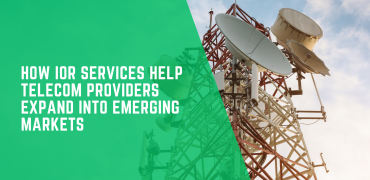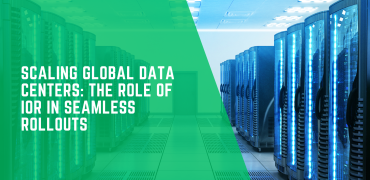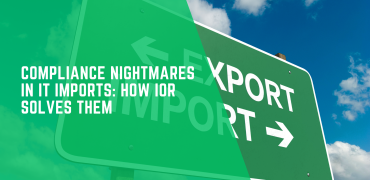In an increasingly globalized world, the demand for IT equipment has surged, driven by the rapid digital transformation of businesses and the expansion of cloud computing, data centers, and telecommunication networks. However, importing IT equipment across borders involves complex regulatory requirements, logistical challenges, and compliance risks. Importer of Record (IOR) services have emerged as a critical solution, ensuring seamless, compliant, and efficient cross-border transactions.
This blog explores the growing importance of IOR services in IT equipment imports, their benefits, challenges, and the future trends shaping this essential industry segment.
1. The Growing Demand for IT Equipment Imports
The IT sector is the backbone of modern economies, supporting industries ranging from healthcare and finance to retail and manufacturing. Key trends driving the increase in IT equipment imports include:
- Digital Transformation: Businesses worldwide are investing in IT infrastructure to support remote work, e-commerce, and automation.
- 5G and Telecommunications Expansion: Telecom providers require advanced hardware to support 5G rollouts and network upgrades.
- Cloud Computing and Data Centers: The demand for servers, storage devices, and networking equipment has skyrocketed as cloud adoption grows.
- Emerging Markets: Developing countries are increasingly importing IT equipment to modernize their infrastructures and participate in the global digital economy.
While these trends present opportunities, they also highlight the challenges of navigating international trade regulations and logistics.
2. Challenges in Importing IT Equipment
Importing IT equipment involves navigating a web of complexities that can lead to delays, fines, or even confiscation of goods if not handled properly. Common challenges include:
a. Regulatory Compliance
- Customs Regulations: Importers must adhere to country-specific rules, which may vary widely and change frequently.
- Trade Restrictions: Some IT equipment may fall under restricted categories, requiring special licenses or permits.
- Data Security Laws: Governments impose strict controls on the import of IT equipment to safeguard against cybersecurity threats.
b. Taxation and Duties
Understanding and calculating tariffs, VAT, and other taxes can be daunting, particularly for high-value IT equipment.
c. Documentation Requirements
Accurate and complete documentation—including invoices, packing lists, and certificates—is essential for customs clearance.
d. Logistics and Supply Chain Management
- Ensuring the safe and timely delivery of sensitive IT equipment requires specialized handling and transportation.
- Delays due to inadequate logistics planning can disrupt business operations.
e. Risk of Non-Compliance
Failure to comply with regulations can result in:
- Financial penalties
- Seizure of goods
- Reputational damage
These challenges underscore the need for expert guidance and streamlined processes, which IOR services provide.
3. What Are IOR Services?
Importer of Record (IOR) services act as a legal entity responsible for ensuring compliance with all regulations, taxes, and documentation required for importing goods into a specific country. In the context of IT equipment, IOR services simplify the process by:
- Acting as the official importer on behalf of the business
- Managing customs clearance and compliance requirements
- Ensuring timely and secure delivery of goods
IOR services cover various aspects, including:
- Regulatory Compliance: Navigating country-specific import laws and securing necessary permits.
- Tax Management: Handling duties, VAT, and other levies.
- Documentation: Preparing and submitting accurate paperwork.
- Logistics Coordination: Streamlining transportation and warehousing processes.
4. Benefits of IOR Services for IT Equipment Imports
IOR services provide a host of advantages that make them indispensable for businesses importing IT equipment.
a. Simplified Compliance
IOR providers stay updated on ever-changing regulations, ensuring that all imports meet legal requirements. This reduces the risk of fines, delays, or confiscation.
b. Cost Savings
By managing taxes, duties, and logistics efficiently, IOR services help businesses avoid unexpected expenses and optimize costs.
c. Faster Customs Clearance
IOR providers streamline customs processes, minimizing delays and ensuring that IT equipment reaches its destination on time.
d. Risk Mitigation
IOR services reduce the risk of non-compliance, fraud, and errors in documentation, protecting businesses from financial and reputational harm.
e. Focus on Core Activities
Outsourcing import responsibilities to an IOR allows businesses to concentrate on their core operations, rather than navigating complex import procedures.
f. Global Reach
IOR providers with a global network enable businesses to import IT equipment into multiple countries seamlessly, supporting international expansion.
5. Real-World Applications of IOR Services in IT Equipment Imports
a. Telecom Infrastructure Development
A telecom company expanding its network to a new country can rely on IOR services to import networking equipment, antennas, and base stations while complying with local regulations.
b. Data Center Expansion
Global cloud service providers use IOR services to import high-value servers and storage devices for setting up new data centers.
c. IT Hardware Supply Chains
Distributors of laptops, monitors, and other IT peripherals leverage IOR services to maintain smooth supply chains across borders.
d. Government IT Projects
Public sector initiatives involving IT infrastructure upgrades benefit from IOR services to ensure timely and compliant imports of necessary hardware.
6. The Future of IOR Services in IT Equipment Imports
As the IT industry evolves, IOR services are set to become even more integral to global trade. Key trends shaping their future include:
a. Increasing Regulatory Complexity
Governments are tightening controls on IT equipment imports to address cybersecurity concerns and protect local industries. IOR services will play a crucial role in navigating these complexities.
b. Growth of Emerging Markets
As developing economies invest in digital infrastructure, demand for IT equipment imports will rise, boosting the need for reliable IOR services.
c. Technological Advancements
Integration of technologies like blockchain and AI will enhance the efficiency and transparency of IOR services, providing real-time updates and predictive analytics for better decision-making.
d. Focus on Sustainability
Businesses are increasingly prioritizing eco-friendly practices. IOR providers will support these efforts by ensuring compliance with environmental regulations and optimizing supply chains for sustainability.
e. Expansion of Service Offerings
IOR providers are diversifying their services to include end-to-end logistics solutions, covering warehousing, distribution, and last-mile delivery.
7. Choosing the Right IOR Partner
Selecting an experienced and reliable IOR provider is critical for success in IT equipment imports. Key factors to consider include:
- Expertise: Knowledge of industry-specific regulations and requirements.
- Global Reach: Ability to handle imports across multiple countries.
- Technology Integration: Use of advanced tools for tracking and managing shipments.
- Reputation: Proven track record of successful imports and satisfied clients.
- Customer Support: Responsive and proactive communication.
8. Conclusion
In a world where technology drives business growth and innovation, importing IT equipment efficiently and compliantly is more important than ever. IOR services have emerged as an essential solution, enabling businesses to overcome regulatory hurdles, reduce risks, and focus on their core objectives.
As the demand for IT equipment imports continues to grow, IOR services will play a pivotal role in supporting global trade and fostering seamless connectivity. By partnering with the right IOR provider, businesses can unlock new opportunities and ensure the success of their international operations.




